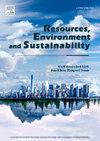基于生命周期思维的早期生物经济项目可持续原料筛选环境风险框架
IF 12.4
Q1 ENVIRONMENTAL SCIENCES
引用次数: 0
摘要
了解生物基原料生产对环境的影响对可持续生物经济发展至关重要。后续生命周期评估(LCA)评估环境的可持续性,通常识别由市场置换引起的“隐藏”影响。然而,由于在时间、数据和专业知识方面的高要求,在项目概念化的早期使用完整的相应LCA筛选多种生物经济原料和价值链通常是不切实际的。因此,在项目开发过程中发现严重的环境风险可能为时已晚,无法将投资转向更可持续的选择。本文介绍了生物基原料环境风险评估(Bio-ERA)框架,旨在支持早期筛选与生物基原料需求增加相关的潜在上游环境风险。Bio-ERA框架包括一个决策树,系统地指导利益相关者通过相应的生命周期思维,阐明原料采购决策中有时隐藏的(间接的)影响途径。七个重要的环境方面:有限资源投入、温室气体(GHG)排放、空气质量、水质、生态系统多样性、陆地碳储量和间接土地利用变化。针对四类原料(主要(决定产品)、高价值副产品、低价值副产品和废物),提出了对(i)环境影响的可能性和(ii)严重程度进行结构评估的标准。示例应用程序演示了该框架如何为来自特定环境的特定原料生成环境风险概况。Bio-ERA并没有避免对整个生物经济价值链进行详细的LCA评估的需要,而是以所有利益相关者都可以访问的方式,促进对与原料采购相关的潜在环境风险的更深入的询问和认识。这可以支持早期筛选发展可持续生物经济所需的战略投资决策。本文章由计算机程序翻译,如有差异,请以英文原文为准。

A life cycle thinking-based environmental risk framework for screening sustainable feedstocks in early-stage bioeconomy projects
Understanding the environmental impacts of bio-based feedstock production is essential for sustainable bioeconomy development. Consequential life cycle assessment (LCA) evaluates environmental sustainability, often identifying “hidden” impacts incurred through market displacements. However, it is often impractical to screen multiple bioeconomy feedstocks and value chains using full consequential LCA early in project conceptualisation, owing to high requirements in terms of time, data, and expertise. As a result, critical environmental risks may not be discovered until too late in project development to redirect investment towards more sustainable options. This paper introduces the Bio-based feedstock Environmental Risk Assessment (Bio-ERA) Framework, designed to support early screening of potential upstream environmental risks associated with increased demand for bio-based feedstocks. The Bio-ERA Framework comprises a decision tree that systematically guides stakeholders through consequential life cycle thinking, elucidating sometimes hidden (indirect) pathways of impact among feedstock sourcing decisions. Seven important environmental aspects are addressed: Finite Resource Inputs, Greenhouse Gas (GHG) Emissions, Air Quality, Water Quality, Ecosystem Diversity, Terrestrial Carbon Storage, and Indirect Land Use Change. Criteria are proposed to structure evaluation of (i) probability and (ii) severity of environmental impact, in relation to four categories of feedstock: primary (determining product), high-value by-product, low-value by-product, and waste. Example applications demonstrate how the framework can generate an environmental risk profile for specific feedstocks sourced in specific contexts. Bio-ERA does not avoid the need for detailed LCA evaluation of full bioeconomy value chains, but promotes deeper interrogation and awareness of potential environmental risks associated with feedstock sourcing, in a manner that is accessible to all stakeholders. This could support earlier screening of strategic investment decisions necessary to develop a sustainable bioeconomy.
求助全文
通过发布文献求助,成功后即可免费获取论文全文。
去求助
来源期刊

Resources Environment and Sustainability
Environmental Science-Environmental Science (miscellaneous)
CiteScore
15.10
自引率
0.00%
发文量
41
审稿时长
33 days
 求助内容:
求助内容: 应助结果提醒方式:
应助结果提醒方式:


